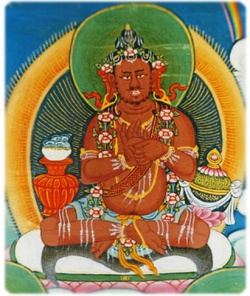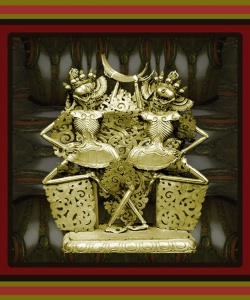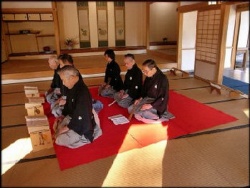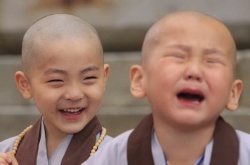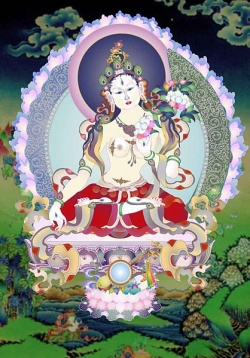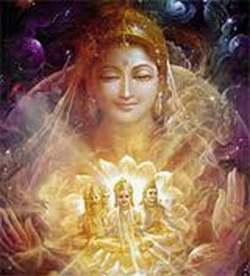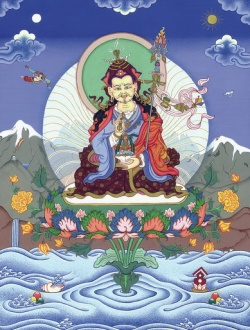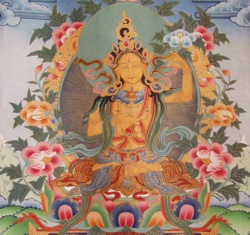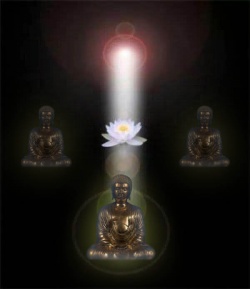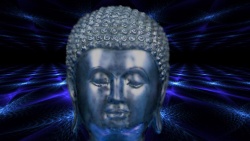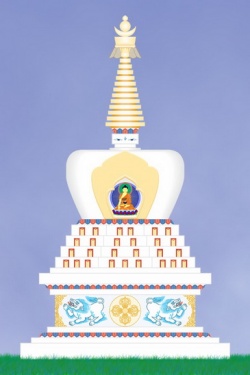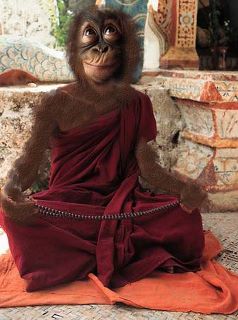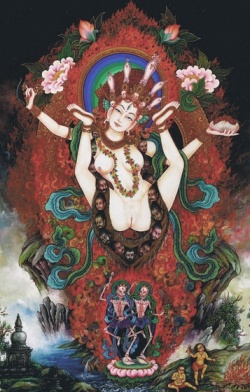Unvirtuous
Unvirtuous Actions
Whatever culture or spiritual tradition we belong to, not committing negative actions means learning to abandon what is seen as improper for ourselves or others. "Negative" or "unvirtuous" is defined as anything that is harmful or destructive to beings, including ourselves.
Unvirtuous actions can be divided into two classifications: (1) natural or automatic (RANG SHIN) unvirtuous actions; and (2) developing (KYE PAY) unvirtuous actions.
Natural Unvirtuous Actions
Since beings have body, speech, and mind it is possible to do negative things unintentionally and without choice. Simply because of the particular circumstances we have been born in, we engage in unvirtuous activity of body. We try to communicate with concepts through our speech, and whenever we talk there is the possibility of creating harm unintentionally in that process. Similarly, mind produces positive and negative thoughts that lead to activities of body and speech. These natural possibilities of accumulating what is not virtuous through body, speech, and mind are known as natural or automatic karmic accumulation.
The assumption of the second type of negative actions is that we are engaged in some religious system and have made certain commitments or taken certain vows. If we have the ability to keep those commitments, but break them, that is unvirtuous action. The idea here is that we have alternatives: we may choose not to take the vow, or we can choose to not break the vow. Breaking a vow we have willingly taken creates a "double" negative karma, since there is the karma of breaking the vow as well as the karma of the negative action.
The question might arise, "How do we accumulate or commit unvirtuous actions?" Unvirtuous actions can be committed through body, speech, and mind. Physically, we could become violent and cause harm. That is unvirtuous action of the body. Verbally, we can say very powerful words that could be harmful or harsh, words that could be painful to others. Regardless of whether the actions are physical or verbal, they must originate from a negative thought in the mind. Therefore, unvirtuous actions are committed through the body, speech, and mind.
Unvirtuous Actions of Body
There are three unvirtuous actions of the body we can accumulate: killing, sexual misconduct, and stealing. These three unvirtuous actions of the body are the main or most powerful unvirtuous actions.
Killing
The first negative action is killing (literally, taking life) and involves the three emotions: hatred, attachment, and ignorance. When we regard someone as an enemy, or the enemy of someone we are trying to protect, the mind develops tremendous hatred. Regarding this individual or group as an enemy, we destroy them. This destruction involves the emotion of hate or anger (SHEDANG). We could also kill beings through attachment, such as having attachment to their meat or fur. When we kill a being because of their meat, skin, or fur, the emotion of attachment is involved. It is also possible to kill through ignorance. Ignorance is the neutral state of not knowing why we are killing--we just enjoy killing. We do not regard the being we are killing to be our enemy. We do not have anger or hatred toward it. We are not killing because the being's fur or meat is useful to us. We are simply enjoying the act of killing, which is killing through ignorance. These are the unvirtuous actions of killing.
When an individual engages in any type of killing, the result of this unvirtuous action is the certainty that this individual will experience inferior rebirth after their own death. A higher birth is never experienced as a result of killing, whether through attachment, anger, or ignorance. Not only will the individual experience an inferior rebirth, but during the next lifetime no matter what that individual tries to do, he or she will be unable to accomplish all of his or her goals. The individual will experience obstacles in life or career, which will prevent accomplishments. These obstacles are the result of the negative karma of killing; therefore, this is called unvirtuous. We must learn to prevent that sort of unvirtuous action, as it is threatening to our lives and development.
Sexual Misconduct
The second unvirtuous action of the body is engaging in sexual misconduct, which can be based on two emotions: attachment and anger. Not much could be caused through ignorance in this case. The general definition of sexual misconduct here is anything that is improper, including anything that is done forcibly (without the consent of the other person) in order to satisfy ourselves or in order to hurt someone else (the reason does not really matter). You might ask how the emotion of anger could be involved. Someone could try to commit sexual misconduct with a person (using seduction) for the purpose of destroying their reputation. That would be sexual misconduct done out of aggression. Sexual misconduct with the mental affliction of attachment simply means committing improper sexual actions in order to satisfy our neurotic desires.
Stealing
The third unvirtuous action of the body is stealing, which means taking something that does not belong to us.
Stealing again involves the three mental afflictions: attachment, ignorance, and anger. When an object is very appealing and we feel attachment to that object and feel that we need to have it, and then take it without the owner's knowledge, that is stealing through attachment. Stealing through ignorance corresponds to what is described by the English word "kleptomania." The person does not have a feeling of attachment or aversion. They just keep picking up other people's belongings because of a habitual pattern. Stealing out of anger means wanting to hurt, harm, or give difficulties to someone else. A person who does this does not need the object, but they know the other person will suffer from its absence. In order to hurt that person, they take away the person's belonging.
To clarify what is meant by taking what does not belong to us, suppose we are living in a community where everyone is sharing something. In this situation, if we take something that is meant to be shared without the other people knowing about it, that is not stealing. Everyone knows it is meant to be shared. Other than that, if it is not understood as shared, if it does not belong to us, and we have no right to have it, then taking it through any means is stealing.
Unvirtuous Actions of Speech
Next are the unvirtuous actions of speech, of which there are four main categories: lying, creating disharmony, harsh and offensive speech, and frivolous speech.
Telling lies also involves the three mental afflictions of attachment, anger, and ignorance.
Lying out of attachment occurs when we lie to gain something, like a better reputation. Lying out of anger occurs when we lie to keep another person from gaining something or accomplishing something--the lie is told to harm someone. Lying out of ignorance means compulsive lying. It occurs when we lie without reason, simply because we have developed a habit of lying. There is neither a hope for personal gain nor the wish to harm someone in this type of lying.
Creating Disharmony
The second unvirtuous action of speech is creating disharmony. This involves a strong pattern of jealousy. Because of the influence of jealousy, we are unable to tolerate the friendships among other people; therefore, we have a strong tendency to create separation among people who seem to be friendly. That is the general definition. Creating disharmony also involves attachment, anger, and ignorance. Creating disharmony based on jealousy but also to achieve personal gain indicates attachment. Creating disharmony to give pain, suffering and misery to someone else indicates aggression. Creating disharmony through ignorance means being a chatterbox. We keep on talking and eventually say something we are not supposed to say, creating a big problem or disharmony. It is not always the case that we are intending to gain something from it or to harm anybody, but if we simply enjoy talking too much (the Tibetan for this is KHA MANG, which literally means, "big mouth"), that is a problem.
There are three classifications of creating disharmony: direct, indirect, and manipulative. The direct way is quite simple, so it does not need a lot of explanation. It just means that, in the presence of the person or people involved, we say all the bad things we feel. The indirect way of creating disharmony means that when the people are in front of us, we say very good things; then when they go away, we say negative things behind their backs. The manipulative way of creating disharmony depends on being very skilled with words. Although the words we use in this case seem to have no direct bad connotation, the overall effect is very offensive. This sort of manipulation takes a lot of cleverness.
Harsh and Offensive Speech
This type of unvirtuous action of speech means engaging in speech that is generally offensive. It includes obscenity and other kinds of coarse talk that tend to upset people. Harsh speech is involved mainly with the emotions of anger and ignorance. It is possible, but not very likely, for this to involve attachment. Speaking harsh words out of ignorance often happens for those who are raised in an environment where such words are common and they become very accustomed to such language. People may develop a habitual pattern of harsh words that are offensive to others without really having any intention of hurting anyone. On the other hand, harsh and offensive speech under the influence of anger means using such language to hurt others, to give them pain and suffering. There is also the possibility of harsh words involving attachment. If we are very attached to relatives or friends and fear losing them, we may think we can control them by using harsh words.
The Tibetan word TSIK TUK, which means "harsh words" also means "criticism." It has a lot to do with the intention of the words being used. Some words may seem to be very gently spoken, but if their intention is to misguide someone, that is regarded as harsh words. In contrast, someone may speak in a very rough, angry or aggressive way, but if their intention is to help we must not misunderstand that. Speaking with an aggressive intent is what is meant by harsh words.
Frivolous Speech
The fourth unvirtuous action of speech is that which is frivolous or useless. The Tibetan word for this, NGAK KHYAI, (ngak khyai), also has the meaning of "rumor" or "gossip." The emotions of ignorance or attachment are involved. Any of our emotions can be stirred up (anger, jealousy, and so forth), but the principle reason for wanting to gossip is ignorance or attachment. Because we are so attached to ourselves, our family, friends, or children, we like to talk and gossip about them. We talk at length about the intelligence of our son or daughter or spouse. That is based on attachment, because we are attached to thinking about them and want someone else to think about them, so we talk endlessly about that individual. Gossiping out of ignorance is a habit that is built into our system. We intensely enjoy talking and we cannot sit still for one moment without talking. In fact, we even go out of our way to find someone to talk to and, whenever we find someone who will listen, we keep talking and talking. If we were to look back and ask what the purpose was of all this talk, we would find there was none; we just wanted to talk.
All these unwholesome or unvirtuous actions have no positive result. By performing unvirtuous actions of speech and body, we are accumulating negative karma, which leads us to more problems and suffering.
Unvirtuous Actions of Mind
Mentally there are also three unvirtuous actions: envy and spite, harmful thoughts, and wrong views.
Envy and Spite
Having envious thoughts means craving things other people have, and it is connected with attachment. We are attached to worldly situations or possessions, such as material belongings, success, power, or fame--things that we are not able to obtain for ourselves. It involves imagining or wishing that we had these things that the others have, things which in reality we are unable to obtain. Making ourselves miserable by these cravings and wishes is the unwholesome pattern of envy.
When this pattern is associated with anger and aggression, there is what is called "spite" in English. This means wishing hardship, misfortune, death, illness, and mental suffering on our enemies.
Harmful Thoughts
Second is harmful thoughts, which are connected to the emotion of anger. Due to disliking or hating someone or simply being angry with them, we develop harmful thoughts directed at that person. Though these thoughts are related to anger, due to our habitual patterns, we sometimes have such thoughts for no reason, in which case they can be regarded as involving the metal affliction of ignorance.
If you naturally enjoy the misery or pain of others without any purpose at all, that is harmful thought. For example, upon hearing that someone has had misery or has died, whatever their relationship is to you, you simply enjoy the death of that person and the pain of the person's family, for no reason. There are some individuals who constantly, without any reason, wish to see pain and suffering happen to beings. Because of that, the moment they hear some negative news (such as that someone has died or is going through suffering), they enjoy it.
Wrong Views
The third unvirtuous action of the mind is wrong views. To define this generally, wrong view means not recognizing or knowing that we have the capacity to do positive things, as well as not recognizing or knowing that we have the capacity to do negative things. Wrong view also means not recognizing that when we engage in positive activities, the result is positive and not knowing that when we engage in negative activities, the result is negative or suffering. All that ignorance is wrong view. Because of this ignorance, there is no belief in anything at all. In particular, if someone tells us that a positive thing is good and will bring a good result, we do not believe it. What we are doing here is like accepting poison as a medicine and medicine as a poison; it is a completely backward understanding. Since we have believed poison to be medicine, we are accepting the poison. Since we have believed medicine to be a poison, we try to avoid or distance ourselves from healing or medicinal things. That is the situation with wrong views.
Among the ten unvirtuous activities of the body, speech, and mind, the worst of all is the wrong view. When we are engaging in activities that are harmful to ourselves and others, we have no remorse since we have a wrong view. As long as we do not accept that we are doing something wrong, we continue to do it, free from any feeling of regret or guilt. That is why wrong view is the worst of the ten unvirtuous actions of body, speech, and mind.
If we do not have wrong view, then although we are in samsara and may engage in any of the other nine unvirtuous actions, the moment we realize that we have engaged in something improper and harmful to others, we repent. Feeling remorse, there is always the possibility of applying the remedy to purify any wrong we have done. The fact that it is always possible to cleanse the negative karma of negative actions is the reason that freeing ourselves from wrong views is so important. Otherwise, we would never recognize that negative actions are, in fact, negative.
The Consequences of Unvirtuous Actions
If we engage in any of the ten unvirtuous actions through intense hate, our rebirth will be in the hell realm. If we engage in any of the ten unvirtuous actions through intense attachment, our rebirth will be in the hungry ghost (preta) realm. If we engage in any of the ten unvirtuous actions through ignorance, our rebirth will be in the animal realm. In particular, if we engage in any of the ten unvirtuous actions with the intensity of anger and wrong view, you will experience rebirth in what is known as the lowest hell realm, known as NAR ME in Tibetan, which means ceaseless. It is a realm of uninterrupted or ceaseless suffering. These are the results of engaging in unvirtuous actions.
Because the results of engaging in unvirtuous actions are not positive but are very painful, the first line of the Buddha's teaching we discussed says, "Abandon all unvirtuous actions." That is the reason for introducing the idea that unvirtuous action is very negative.
We have talked about a total of ten unvirtuous activities of the body, speech, and mind. Because we all have the capacity to engage in those ten unvirtuous activities as part of our systems, the first definition or classification of the unvirtuous activities, as I said earlier, is natural what is not virtuous. The second classification is developing what is not virtuous.
I mentioned that the developing what is not virtuous involves having taken commitments or vows (such as tantric samayas or other different kinds of vows). There is one thing we should understand from the start: There is a tremendous advantage in taking vows, as well as a tremendous disadvantage. Virtuous action is multiplied by learning to keep vows. Therefore, we may want to expedite our enlightenment and cleanse our negative karma by taking vows. Taking vows is very positive, if we can keep them. We may take several vows (tantrayana, mahayana, hinayana, or whatever) because we want to expedite our development. This is what I meant by saying there is an advantage. If we can keep the vows, it is a very powerful step toward cleansing or developing toward enlightenment. However, if we are unable to keep them, and break the vows, we have committed quite powerful negative karma. There is the negative karma connected with the action, and there is the additional negative karma associated with breaking the vow. That is why the word KYE PA (developing) is used here for this negative karma. It is developed or expanded in scope by breaking the vow.
Often in ancient times there was what we could safely refer to as a "heretic." (This does not happen so often nowadays, because people are more intelligent.) What happened was that at the beginning the person was very much intrigued with seriously studying, learning, and practicing the Buddhadharma. Then after some time, perhaps a month or a year, the person came to totally dislike the whole concept of what he or she had previously respected and whatever vows or commitments he or she had taken. Not only did the person lose respect but he or she no longer had any belief in the positive result of the virtue whatsoever. Not having belief in the positive result of the Buddhadharma in particular is the worst negative karma. When there is this sort of situation, rebirth is in what is known as the vajra hell, which is the lowest of the lowest hells and is very powerful. This situation really does not happen much, but I just wanted to give you the information.
When we talk about the negative karma that results from breaking vows, often the thought arises, "Well, in that case it would be much safer not to take on any particular commitments. I will be safer that way because I cannot break the commitment, and by not breaking a commitment, I am not accumulating any heavy negative karma. Isn't that safer?" Not really. As Sakya Pandita, one of the most learned masters of the Sakya tradition, explains in his poetic way, "The negative karma of learned people is the lightest, and the negative karma of the ignorant ones is the heaviest of all."
To explain what Sakya Pandita meant here, it is very true that for those who engage in all sorts of practices, taking commitments and so forth, there is the possibility of committing heavy negative karma by breaking the commitments. However, the advantage and the qualities of the Buddhadharma are such that, though we may have accumulated heavy negative karma, we have the means to apply the remedy to purify that negative karma. With these methods, we can actually put the remedy into practice, and thus we may not have to experience the fruition of the negative karma.
On the other hand, the spiritually ignorant ones (those who are not learned in this sense) are those who do not engage in the taking of vows or commitments. Their negative karma may not be as heavy as that accumulated by breaking a vow, but they have no remedy to purify it either, and the piling up of small negative karma becomes extremely heavy in the long run. That is the meaning of Sakya Pandita's explanation that the negative karma of the learned ones could be light and that of the ignorant ones could be heaviest of all.
The Five Immeasurable Crimes
Based on the Buddha's teaching, "Abandon all unvirtuous actions," we have been discussing the ten unvirtuous actions of body, speech, and mind. Having discussed all of these, you may wonder if those are the only negative actions people can commit.
Unfortunately, there are also what are known as the five immeasurable crimes. The term for this in Tibetan, TSA ME PA, means "no barrier." This could also be translated as "without barrier," meaning that beings who commit such actions experience the result without going through the barrier (the intermediate experience) of bardo at the time of death.
Why are these five called immeasurable crimes? If we commit any of the ten unvirtuous actions we have talked about so far, it is possible that we may experience the ripening of the negative karma of those actions in the bardo state after death, during the first, second, third, or fourth week of that state. If that ripening does not happen in the bardo state between death and rebirth, we may experience the result of that negative karma in the next lifetime.
However, the crimes we are now going to discuss are called immeasurable, or beyond barrier--beyond the intermediate state (bardo)--because there is no gap after death before the experience or fruition of the negative karma. The moment the person dies, that very instant, they get into the result of the negative karma. Because of that quickness, they are know as immeasurable, or beyond barrier.
The first of the immeasurable crimes is patricide, killing one's father. To have the negative karmic accumulation we are discussing here, four conditions must be met: 1) The person must have full knowledge that the victim is their father; if there is some confusion, and they do not know it was their father, that would not be regarded as this particular action; 2) intention or preparation to kill; 3) carrying out the plan to commit the murder; and, finally, 4) feeling satisfaction that he has been killed. If all these conditions are met, the person has committed the first immeasurable crime, and it is a very heavy or intense crime. Although it is a very intense crime and the result comes in an instant after death, if the perpetrator has regret or remorse, there is always a possibility for purification.
The second immeasurable crime is matricide, killing one's mother. Again, the person must commit this crime with definite intent, knowledge, and then a feeling of rejoicing or satisfaction after having committed the action. We might ask why these two--the killing of one's father or mother--are regarded as immeasurable crimes. Our physical existence is based on our father and mother; we could not possibly have it without them. Because of this, if, instead of repaying that kindness with gratitude we destroy them, that is categorized as an immeasurable crime.
The third immeasurable crime is quite similar. Our spiritual master (or lama) is someone from whom we obtain teachings and advice, particularly that which is healing and beneficial to our minds. Having obtained such assistance, if instead of repaying that person or feeling gratitude, we kill that person, we have destroyed the person who has helped us mentally. Therefore the third immeasurable crime is killing one's teacher.
The term spiritual friend here refers to someone that we have taken as our personal teacher. Having taken that person seriously, to then kill such a person would be an immeasurable crime. To kill other teachers who we have not taken as our personal teacher is very negative, of course, but it would not fall in the category of an immeasurable crime.
While we are on that subject, I would like to add one point: It is important to judge the authenticity of a lama or spiritual friend. Authentic spiritual friends or lamas would only be concerned with wanting to help or benefit us and all their students, with almost no regard for their own fame, fortune, and well-being. Having found such a teacher and having obtained instruction and teaching from such an individual, we can then regard that person as a true teacher. However, in samsara there are many others who are false teachers or who pretend to be spiritual friends. It is important from a student's point of view to recognize that falsity, because such people could be quite deceptive and selfish, lacking the altruistic mind. Even if we obtain teachings from such people, they cannot be regarded as spiritual masters or lamas.
The fourth immeasurable crime is something we do not have to worry about, but I will mention it just to give you the information. It is known as shedding blood from the body of an historical Buddha. During the time Shakyamuni Buddha was living and giving teachings, if someone threw a stone or anything at him out of anger or hatred, shedding blood from his body, the person would have committed this crime. Since Shakyamuni Buddha's physical body is not present at this time, we do not need to worry about this crime. This type of negative action refers to any historical Buddha, not only Shakyamuni Buddha, who turned the wheel of Dharma for us.
The fifth immeasurable crime is known as creating disharmony in the Sangha. That possibility was very powerful during the time of the Buddha, and we must be careful ourselves, because we could engage in such a crime now as well.
When there is a community of at least four ordained nuns or four ordained monks, that fulfills the meaning of Sangha as we are discussing it here. Creating disharmony within such a Sangha is based on jealousy or dislike. Based on that jealousy or dislike, someone develops a motive or intention to create separation within the community. Sometimes this is due to partisanship, when a person feels attached to their own tradition. Attempting to support their own tradition, they create disharmony in another group, feeling that by creating a split they would obtain strength or advantage for their group. With these kinds of intentions, people create disharmony.
Creating disharmony within the Sangha is regarded as an immeasurable crime for several reasons. First of all, wherever something negative like this is created in any group, it is certainly not at all positive. In this case, within that group of four or more nuns or monks, who were quite harmonious and happy practicing together, negative feelings and separation between them jeopardize all of their spiritual progress. When there is disharmony and anger or jealousy among them, the calm of their minds has been disturbed. Disturbing their ability to maintain the state of calm necessary for meditation causes obstacles in their progress toward the awakened state. Having done so, whoever does this has harmed not only that group of individuals but those individuals' ability to benefit beings. Thus it is an immeasurable crime to create separation within the Sangha.
These are the five immeasurable crimes, which are very intense and powerful. If we have committed such a crime and then, realizing that we have made an enormous error, feel remorse or regret, and apply the remedy, the result of the negative karma can be prevented. If we have committed such a crime and do not feel remorse or regret, and we do not apply any sort of remedy (purification practice) before the end of our lives, we will go through tremendous, unbelievable suffering as the result of the such crimes.
We have all engaged in every sort of unvirtuous action, either the ten unvirtuous actions or the five immeasurable crimes. Based on those unvirtuous actions, we are still in samsara in this life. We have never liberated ourselves in the past. Because of this, we cannot even imagine the beginning of our confusion. There is no beginning. From beginningless time until now, we have been constantly engaged in unvirtuous action. As a result of unvirtuous action, we are constantly in samsaric existence.
How did we end up being in samsara, unable to liberate ourselves? We know we do not want to suffer, but in our efforts to overcome suffering, we actually create more karma, which leads us to experience additional and perhaps more powerful pain and suffering. Accumulating this, we end up in a continuous pattern of existence.
There is a proverb in Tibet that could be related very well to the reason we are unable to liberate ourselves from samsara. This proverb is, "You cannot wash blood off your hands with blood." Someone with bloody hands would want to wash them, but washing them with blood only makes them bloodier. Similarly, when we are in samsara, we want to get rid of our suffering and liberate ourselves, but by our efforts to liberate ourselves. We are creating more karma.
Karma is infallible; we cannot escape from our actions. There has never been a case in which someone committed negative actions and somehow the karma failed to ripen, or a case in which, during the gap between the commission of the negative actions and the ripening of the karma, that karma deteriorated. It never happens. Once karma is accumulated, it never fails to ripen for that individual. Also, if we commit negative actions, that particular karma never ripens for someone else. We are responsible for all our negative karma, because we are the one who has engaged physically and verbally in committing our actions.
It often happens that when we commit negative actions, we also develop what are known as habitual patterns. When that habitual pattern develops, it seduces us into doing more negative actions, so we engage in a continuous process of accumulating negative karma. These habitual patterns are very powerful. Realizing that the result of the negative actions we engage in physically and verbally is infallible, the proper way to prevent negative karmic accumulation is to overcome and reverse such habitual patterns.
We take rebirth in accordance with the negative karma we accumulate based on our habitual patterns. If the result of the karma is such that it causes us to take rebirth in the animal realm, we experience animal birth. If we have accumulated enough karma to take rebirth as a human, we take human birth. Whether we take human birth or animal birth, the habitual patterns of what is not virtuous that we are so familiar with are quite powerful within us. When we hear about the possibility of experiencing a totally different birth from human or animal, we may think, "then who is experiencing the suffering?" The mind is the experiencer of suffering, not the physical body. The physical body varies from human or animal to any other realm but, in any case, that which experiences the result or outcome of the karma is one's mind. Realizing that, we need to try to reverse all the negative habitual patterns in which we have engaged from beginningless time.
We should understand that the result of negative action comes about in accordance with its foundation or cause. When we commit a negative or unvirtuous action, it might seem to be quite a minor or inconsequential thing and the time during which we have engaged in that action may be very short. This does not mean that the result will be light. In the sutras it says that even though the time that a person has engaged in a negative action may be short, the result is quite intense. For example, suppose that out of tremendous anger you hit someone over the head with a stick, creating pain for that person. The time you took for this action might be very short. You simply became angry and struck the person's head. If you fail to purify such an action, the result of such negative karma is that you will experience about a thousand years in the hell realm. During those thousand years, you will experience suffering 24 hours a day. This is very long, intense suffering that resulted from a moment of anger.
It is often said that sentient beings are ignorant and confused. When we say they are ignorant or confused, there is also the implication that they have the potential to be free from ignorance, to be free from confusion. In fact, all sentient beings have that potential of being free from ignorance and confusion. Although that potential exists within every one of us, we may not fully succeed in realizing our potential--the purity of freedom from confusion--until we learn to avoid or abstain from all unvirtuous action. First we must acknowledge that we indeed have a propensity within our minds toward unvirtuous action. Acknowledging that, we must develop an intention to be free from unvirtuous action. That is where the second line of the Buddha's teaching comes in.
